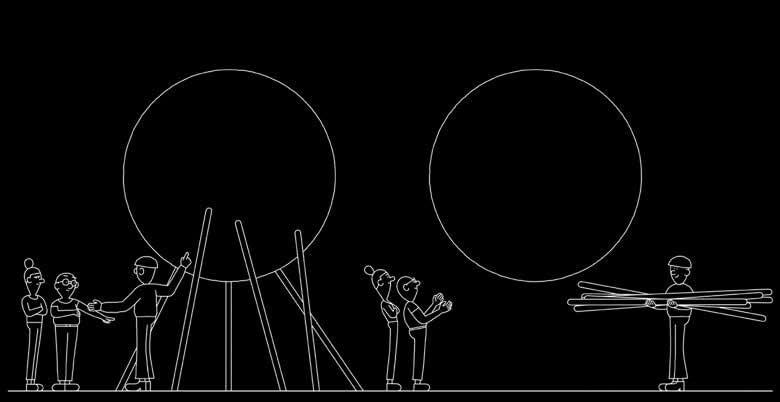Get defensive
Let’s come at this backwards. The aim is to attack the market with an offer that will transform the fortunes of the brand. A daring innovation, a revolutionary way to come to market, a jaw-dropping simplification, with pricing to match.
But before any fortunes can be transformed, the offer must be made real, since customers were never moved by intentions alone.
That – stepping back – requires the willing collaboration of dozens of specialists across the organisation. And that won’t happen unless the most senior among them have been persuaded by the promise of what, at the outset, was nothing more substantial than an idea. There are vulnerabilities all along this chain but the point of greatest fragility is close to the beginning, when those who have devised the new concept – a small group, a team of two or three, perhaps a single individual – first share it with others.
It might be dressed up in a little PowerPoint, of course, and adorned here and there with speculative figures, but it’s hard to disguise the nakedness underneath. People like to wax about “the power of ideas” but they rarely seem like that at the beginning, in their inchoate and innocent form, all “what ifs” and “proposals for” and “journeys toward”.
If the idea carries within it some genuinely transformative DNA, it will almost certainly look a bit crazy and be unsettling at first sight. That is practically an invitation to give it a hard time: the ultimate aim may be to attack the market but the first salvoes will be fired inward, by nervy colleagues. “Won’t that threaten our current customer base?” “Where’s the evidence that people are ready for this?” “We’ve all seen this kind of thing fail before.”
Aware that their questioning and demurring may dampen the spirit of innovation within the organisation, some senior managers call for a moratorium on the critique of new ideas, to give them time to establish roots. Others will insist on codified moderations of language – “build”, “develop”, “delta” – in order to prevent the conceiving team from “getting defensive”.
They shouldn’t bother. Tough questions are going to be asked at some point along the line, and they might as well be tackled now, before the money is down. As for being defensive, that is precisely what the originators should be. It’s time to stop equating defensiveness with stubborn petulance; the truth is more organic and more inspiring than that.
 Interesting things happen when originators put up a sustained, impassioned defence of their ideas, in the face of the hostility or indifference of those around them. The first is that they get to understand their creations better themselves – to deconstruct aspects that might have been arrived at intuitively and find reasons for why they are right.
Interesting things happen when originators put up a sustained, impassioned defence of their ideas, in the face of the hostility or indifference of those around them. The first is that they get to understand their creations better themselves – to deconstruct aspects that might have been arrived at intuitively and find reasons for why they are right.
In so doing, and often without them realising it, the originators will slightly modify details of their own creations. There is an organic flow to this back and forth of attack and defence, reflecting the nature of new ideas themselves – at least, those in the commercial sphere. They are rarely single bare threads of thought, but clusters of connected elements, like the sub-plots in a movie.
Any or all of these elements are apt to come under attack in the heat of debate but the originators won’t defend all with equal verve; some things will be let go, albeit reluctantly, while others will be fought for with extraordinarily defiant zeal.
This gives everyone a sense of what the essence really is – the part of the idea that the originating team instinctively insists on keeping sacred, come what may.
The process can be messy and not without rancour. Losing some of the connected elements may prompt originators to claim their concept has been diluted. But the reverse is true: the idea has been intensified, through the removal of aspects that might be interesting but were probably always peripheral.
Argumentation – attack, defence – is a form of collaboration, even though it might not look like it when the brickbats are flying. It’s certainly a more effective kind than the one that’s descended from the classic workshop format, where no-one is allowed to openly criticise and ideas are left to shrivel in a kind of intellectual no man’s land.
So let new ideas face the fire – they might be fragile but their creators are generally made of sterner stuff. And let originating teams know that you will give air to their spirited defence, no matter what the seniority and apparent expertise of the critics. If the defence falls short, or if the originators finally yield, it will be because the concept wasn’t up to it, not through any power dynamics around the table.
Your ambition, remember, is nothing short of brand transformation, so this is no time for lily-livered consensus management.
By tolerating attack and encouraging defence, you will have transformed the idea itself, from its delicate early form to something ready for the indignities of the ruthless journey forward.
“When someone hatches an original idea, it may be ungainly and poorly defined but it is also the opposite of entrenched –and that is precisely what is exciting about it.”
Ed Catmull, president, Pixar
“An inventor’s path is chorused with groans, riddled with fist-banging and punctuated by head scratches.”
James Dyson, founder, Dyson
“New ideas pass through three periods: 1) It can’t be done. 2) It probably can be done, but it’s not worth doing. 3) I knew it was a good idea all along!”
Arthur C Clarke, author
“Anyone working on a big vision will get called crazy, even if you end up right. Anyone working on a complex problem will get blamed for not fully understanding the challenge, even though it’s impossible to know everything upfront. Anyone taking initiative will get criticised for moving too fast, because there’s always someone who wants to slow you down.”
Mark Zuckerberg, founder, Facebook
“When a good idea comes, part of my job is to move it around, see what people think, get people talking about it, argue with people about it, get ideas moving among that group of people, get different people together to explore aspects of it quietly – and, you know, just explore things.”
Steve Jobs, founder, Apple
